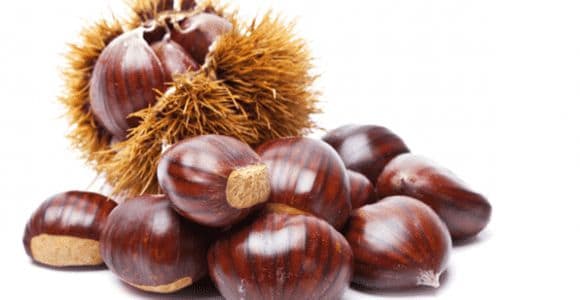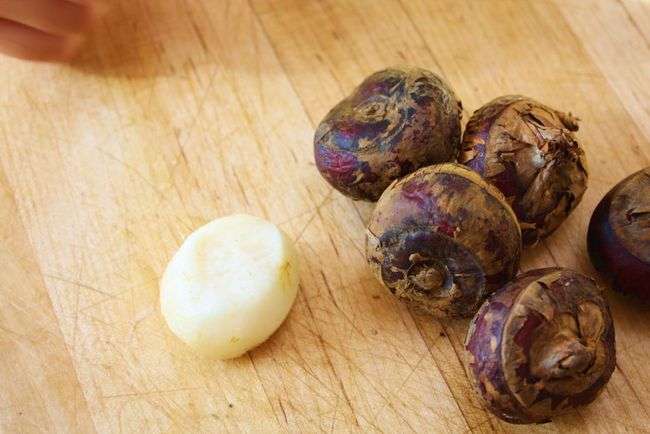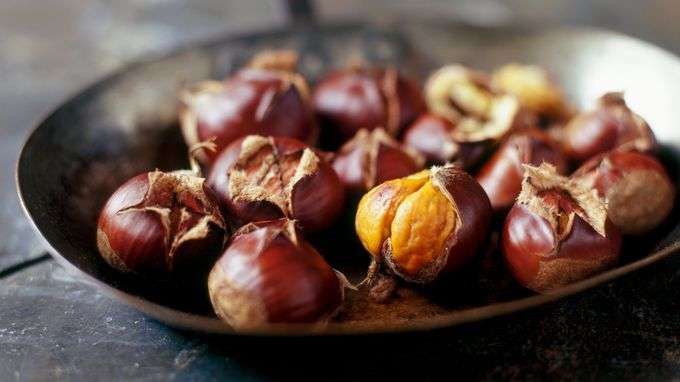Humans cultivate chestnuts for a very long time, over 400 decades! All over the world, chestnuts are a great choice if you want to eat less fat and more complex carbohydrates. Humans have enjoyed this type of nut as it remains a typical snack across the world. Like most foods we want, we debate giving a bite to our pups. In this article, we got your back! You will learn if dogs can have cooked or raw chestnuts without a problem and when chestnuts are bad and dangerous and can cause problems to dogs.
So, can dogs eat chestnuts? Yes, dogs can eat chestnuts! It would be great if you feed chestnuts to your dog but in moderation. Chestnuts are a healthy option for them because they’re loaded with protein, fiber, a pack of vitamins, omega-3 and omega-6 fatty acids. However , proper preparation is essential prior to consumption in order to avoid danger of choking or poisoning by sodium ion to your dog.
Can dogs eat chestnuts?

If you are thinking of extending your dog’s diet, and wonder whether dogs can have chestnuts, or if chestnuts are bad for dogs, then you don’t have to worry. Yes, the short answer is that dogs can easily eat chestnuts (if they like them, of course), but you must be cautious with some things.
Chestnuts are a great source of fiber, potassium, omega three fatty acids and protein. They could be a great add on for almost any dog’s diet, given in moderation.
There are a few things you have to keep in mind before you give chestnuts to your pup:
- Get chestnuts that have no extra salt. Salt in large quantities can be harmful and noxious for dogs’ health.
- Too many chestnuts may cause digestion problems in dogs.
Unlike humans, dogs have a hard time digesting starch and chestnuts have plenty of it, especially raw.
- If you don’t remove the shell, chestnuts can be dangerous and choke dogs, tiny breeds.
- Make sure that your dog won’t eat raw chestnuts. Always cook them before serving them to your pup.
These nuts are not harmful or toxic to dogs (cats and horses can eat them too), according to the American Society for the Prevention of Cruelty to Animals® (ASPCA®).
However, you must always keep in mind that accidents can happen very easily and in a very unexpected way no matter how careful we are. Even if those accidents aren’t deadly, God forbid, they are not inevitable. And most times these accidents can result in sudden and colossal veterinary bills. It would be beneficial for all responsible pet parents, to get a free online pet insurance quote from Healthy Paws.
Chestnuts Nutrition Facts
Chestnuts are really good and healthy for dogs but also for humans.
This table from the NutritionData shows the nutritional value of 100 grams (3.5 oz.) of Chestnuts nuts.
100g of Chestnuts
| Water | 40.48 g |
| Energy | 245 Kcal |
| Protein | 3.17 g |
| Total Fats, (omega-3 and omega-6 fatty acids) | 2.2 g |
| Carbohydrate | 53 g |
| Fiber (dietary) | 5.1 g |
| Sugars (including NLEA) | 10.6 g |
| Iron, (Fe) | 0.72 mg |
| Vitamin C, (ascorbic acid) | 24 mg |
| Vitamin A | 24 IU |
| Total Omega-3 fatty acids | 93.0mg |
| Total Omega-6 fatty acids | 776mg |
| Potassium, (K) | 592mg |
Why Are Chestnuts Good For Dogs?
As we have already explained, dogs can eat chestnuts, now it’s time to dig a little deeper and clarify why chestnuts are good for dogs and why you should moderately feed them.
There are some critical reasons why chestnuts are so good and beneficial for dogs. They have high amounts of dietary fiber, omega-3 fatty acids, protein, potassium, and other essential micronutrients like good sugars, vitamins and minerals.
The Health Benefits of Chestnuts For Dogs (and humans)
Omega-3 Fatty Acids
Omega-3 fatty acids belong to the healthiest category of fatty acids. They can help to many functions in humans’ and dogs’ organisms. They can prevent heart diseases and can help to repair the damaged blood vessels.
Also, omega-3 fatty acids can improve the mood, the brain function and the memory. Skin moisture recovery is one of their benefits too.
However, if the omega 3 fatty acids are useful for humans, they are also efficient for our furry canine friends. They are a vital source of energy that reacts on their body’s cell’s membranes, along with the mental and physical benefits for dogs that I analyze below.
Moreover, there is a component in omega-3, which is called DHA. DHA is required for dogs so they can develop decent brain functions, as well as eye development. It is also known that DHA helps senior dogs with cognitive aging issues.
For dogs with kidney issues, omega-3 fatty acids can assist in improving or reverse the progression of chronic kidney diseases.
In addition, omega-3 fatty acids are constructive for dogs’ joints. Studies have shown that they can decrease inflammation; hence they reduce any existent arthritis pains. Omega-3 fatty acids can also help dogs with chronic kidney diseases to recover or minimize them.
Protein and Fiber
Other vital macronutrients in dogs’ diet are protein and fiber. Protein is disintegrated into amino acids after being digested. These amino acids help dogs rebuild damaged tissues and muscles and are a form of energy in some cases.
The fiber that chestnuts contain is high enough to surpass the amount than even walnuts have! As we mentioned in the board above, chestnuts contain 5.1 grams of dietary fiber per 100 gram.
Further, fiber is a necessary nutrient that helps with dogs’ digestive health. It is responsible for maintaining the healthy bacterial intestinal flora needed and prevents the overspreading of pathogenic bacteria.
Potassium
Potassium is another excellent mineral for dogs, and there is plenty of it in chestnuts. As we said before, there is 592 mg of potassium in 100 grams of chestnuts.
It can improve dogs’ health in various functions, and it is an essential electrolyte for their body system. Proper heart, brain and muscle function and activity are areas that potassium plays an important role.
However, if dogs’ potassium levels decrease significantly, they will probably develop hypokalemia. The reason dogs’ potassium stocks empty because they lose it through their urine.
Suppose you notice any symptoms like vomiting with no apparent reason, lethargy, lack of appetite, or muscle mass loss. In that case, you should pay a visit to your veterinarian to run some tests on your dog.
If the vet tells you that there are low potassium levels in their blood, you must supply their diet with foods rich in potassium. Dogs can eat chestnuts to replenish potassium levels. But you should always ask your vet first thing when you are going to make any changes in your pet’s diet.
Vitamins
All nuts have many vitamins and healthy fats, but chestnuts are a little bit more special. They are the only nut from the nut family that contain considerable amounts of Vitamin C, ascorbic acid, a valuable antioxidant.
Another fantastic fact is that dogs’ liver can create vitamin C on its own. This is an ability we humans have not.
Having said that, don’t worry that your dog may receive more vitamin c than he really needs. It is not hurtful, and his body will handle it easily. Besides that, synergistically with the omega-3 acids, vitamin c plays a significant role in inflammation decrease and cognitive age control.
In conjunction with vitamin C and Omega-3, chestnuts include Vitamin A, and Omega-6 fatty acids in considerable amounts, improving the overall dog’s health.
So can dogs have chestnuts safely?
Other healthy nutrient components benefits of Chestnuts
Yes, dogs can have chestnuts without a problem as we have already mentioned! In the first place, they’re a terrific source of vital minerals, such as iron, zinc, copper, magnesium, phosphorus, and manganese.
Also, chestnuts contain essential minerals for essential body functions, such as maintaining good bone health and healthy joints and blood vessels and nerves, and the immune system.
Magnesium is vital for healthy bones, nerve function and maintaining regular blood pressure and muscle development.
Zinc plays a significant part in boosting the immune system, avoiding diseases, and cell healing.
Iron is a critical piece of hemoglobin, the material that’s vital for carrying oxygen throughout your body. A deficiency of iron in the diet may result in anemia and fatigue.
Chestnuts are also an excellent source of numerous antioxidants, which helps to defend the body from toxins which may harm the body’s cells.
Antioxidants are known for preventing cancer and specific ailments.
Protein is a significant energy source to your entire body, used to reconstruct muscle and make new cells.
Are Chestnuts Bad for Dogs?
Now that we have made clear if dogs can eat chestnuts, we will have a look at the other side. What are the dangers when dogs eat chestnuts? What should you avoid?
Perhaps chestnuts are bad for dogs if you don’t prepare them right.
Even though chestnuts are not included in the toxic foods for dogs, you have to be really cautious before you feed them to your pup. You must prepare the chestnuts for your dog with attention.
Chestnuts that are bought from the stores often contain high amounts of salt. This is done by the manufacturing companies to taste better. Nevertheless, the excessive amount of salt in dogs’ diet is really damaging their health. Dogs’ needs in sodium are meagre in relation to humans.
To understand this point of view, humans should take from their diet, from 1,500mg (an ideal limit according to the American Heart Association) to strictly 2,300mg maximum of sodium daily.
The majority of the United States people don’t seem to take the American Heart Association into consideration. Their daily sodium intake is close to 3,400mg per day.
Whereas this is unhealthy for humans, we don’t suffer the issues right away. On the other hand, dogs can experience instant problems in their health if they eat too much salt.
Sodium Toxicity
The most common problem in dogs which consume a lot of salt is water deprivation–sodium ion intoxication. Dehydration comes really fast when an excess amount of sodium goes into dogs’ bodies. The cells dehydrate as the water leaves the cells and then hypotension comes.
Of course, you can reverse this dangerous situation with rapid medical treatment. If it won’t be fatal, it will often cause severe damage to any dog.
This can be a sign of the symptoms below:
- Extreme thirst and urination
- Loss of appetite
- Lack of energy
- Fluid buildup
- Muscle spasms
- Tachycardia
- Nausea
- Respiratory distress
- Headache
- High fever
- Coma
- Confusion
- Convulsions
- Stomach pains
- Tongue swelling
- Vomiting
- Watery diarrhea
You Can Also Read
If sodium doesn’t look important to you, you will be surprised when you notice how crucial it is for your dog’s diet. The electrolytes are essential to balance the functions of the cells. When you learn how much sodium in general dogs needs, then you will understand how quickly electrolytes can leave from the cells.
A medium-sized dog at about 30 pounds, needs 100mg of sodium per day. This amount is the 1/23 of the maximum amount a human needs per day, (don’t forget that the average American eats 2,500mg of sodium per day at least), can you relate the vast difference?
Supposing that 28 grams (1 ounce) of chestnuts contain about 10mg of sodium, (the 1/10 of what a medium-sized dog needs in a day), think how much sodium will be in the chestnuts with the added salt from the stores.
Store-bought chestnuts could have at least twice the amount unprocessed chestnuts have. Besides that, dogs which eat the ordinary dog food, are probably getting the 100mg of sodium they need. Therefore, you must not feed your pup other foods high in sodium because it will damage your dog’s health.
Remove the Chestnuts’ Shell! Choking Hazard For Dogs!
Something else that you should take care of is the shell of the chestnuts. The shells are hard, and many dogs can’t chew them effectively. They also have a specific size, and the risk of getting stuck in a dog’s throat airway isn’t impossible. You need to definitely remove the shells before giving any chestnuts your dog to have. That’s not a difficult problem to solve.
Now the choking danger of this snack is eliminated, and your dog can have chestnuts without a problem.
If dogs eat high amounts of raw chestnuts, that will be a problem. Raw chestnuts have a lot of starch, which is something that dogs have a hard time digesting, in contrast with humans. High amounts of starch can cause digestive issues, diarrhea, vomiting and sometimes low bowel movement.
In some cases, starch can cause pancreatitis to dogs.
How Should You Prepare Chestnuts For Dogs?

You can boil or roast the chestnuts on a grill. Dogs can have chestnuts in these forms better than raw. That way the starch is reduced and the tannic acid dissolves. Besides that, you can remove the shell easier when they are cooked. Hey! Don’t forget to let them cool down first, and then peel them off and give them to your doggy.
Can Dogs Eat Water Chestnuts? Are Water Chestnuts Bad For Dogs?

Yes, dogs can eat water chestnuts without any problem. The best way to serve them is fresh and not canned. Canned water chestnuts might have high amounts of salt and additives that are harmful to dogs. Water chestnuts contain a lot of starch too, so they can make digestion problematic in large quantities. Nevertheless, dogs can have water chestnuts in their diet in moderation. They can be a nutritious add on the doggy snack. Don’t forget to remove their skin too because it can cause choking hazards to dogs. Finally, you can cook them and make them into a puree so you can add it to your dog’s everyday food.
Frequently Asked Questions for dogs and chestnuts
What can I do if my dog eats raw chestnuts from nature?
If dogs eat raw chestnuts from the tree that will probably not be a problem, because it is natural and organic with no additives. However, many dogs aren’t used to eating raw foods, especially chestnuts which contain high amounts of tannic acid and starch. Firstly you have to be sure that the dog didn’t eat a lot of them. Secondly, ask your vet if you should get involved or just let him rest and his system will eliminate the bad stuff. If your dog eats many raw chestnuts, he may have diarrhea or vomiting symptoms because his digestive system will be pressured. You must check on him either way.
Are Chinese chestnuts poisonous to dogs?
No, they are safe. Chinese chestnuts is another name for Water Chestnuts. Dogs can eat Chinese chestnuts like regular chestnuts. As we have already mentioned, you must avoid the horse chestnuts because they are poisonous to dogs and can be fatal if ingested.
Can Dogs Eat Roasted Chestnuts?
Yes, dogs can eat roasted chestnuts, plain, without any salt or other additional spices. After they get cold, it is safe for dogs to eat them. Don’t forget that anything that comes from the stores in a package has additives (salt, preservatives etc.). Roasted chestnuts in this form could possibly be harmful to dogs if consumed in high amounts.
Can dogs eat horse chestnuts?

Many people ask “Are chestnuts from horses good for dogs?” But the right question is, “Are horse chestnuts good for dogs?”. The answer is NO. You should never give or let your furry friend eat anything like this. They look like a lot, and for that reason, you should watch out!
According to the ASPCA, horse chestnuts are very toxic for dogs, cats and horses (even if they are called horse chestnuts haha).
Are Sweet Chestnuts Safe for Your Doggy?
Dogs can have sweet chestnuts without a problem as long as you cook it appropriately for them. Humans can eat them too.
**Note** Horse chestnuts are toxic to dogs and humans.
In Conclusion: Can Dogs Eat Chestnuts?
To sum up, dogs can eat chestnuts! They are very nutritious and beneficial for dogs when you feed them in moderation. Moreover they contain dietary fiber, complex carbohydrates, protein, omega-3 and omega-6 fatty acids as long as vitamins and minerals! All these nutrients can support any dog’s health. Before feeding them to your furry friend, don’t forget to remove the shell because it can be a choking hazard.
Additionally always go for organic homemade chestnuts and try to avoid the packaged or canned chestnuts from the stores. Most of the time, they have additives, salt and preservatives, and these components are harmful to dogs. As we always do with foods like chestnuts, feed them in moderation to treat your furry friend or as a supplement to its everyday dog food. We hope you and your beloved pets enjoy your chestnuts safely!
Related Posts
Can Dogs Eat Scallops? Are Scallops Safe? (2021 Guide)
Sources:
https://www.aspca.org/pet-care/animal-poison-control/toxic-and-non-toxic-plants/chestnut



